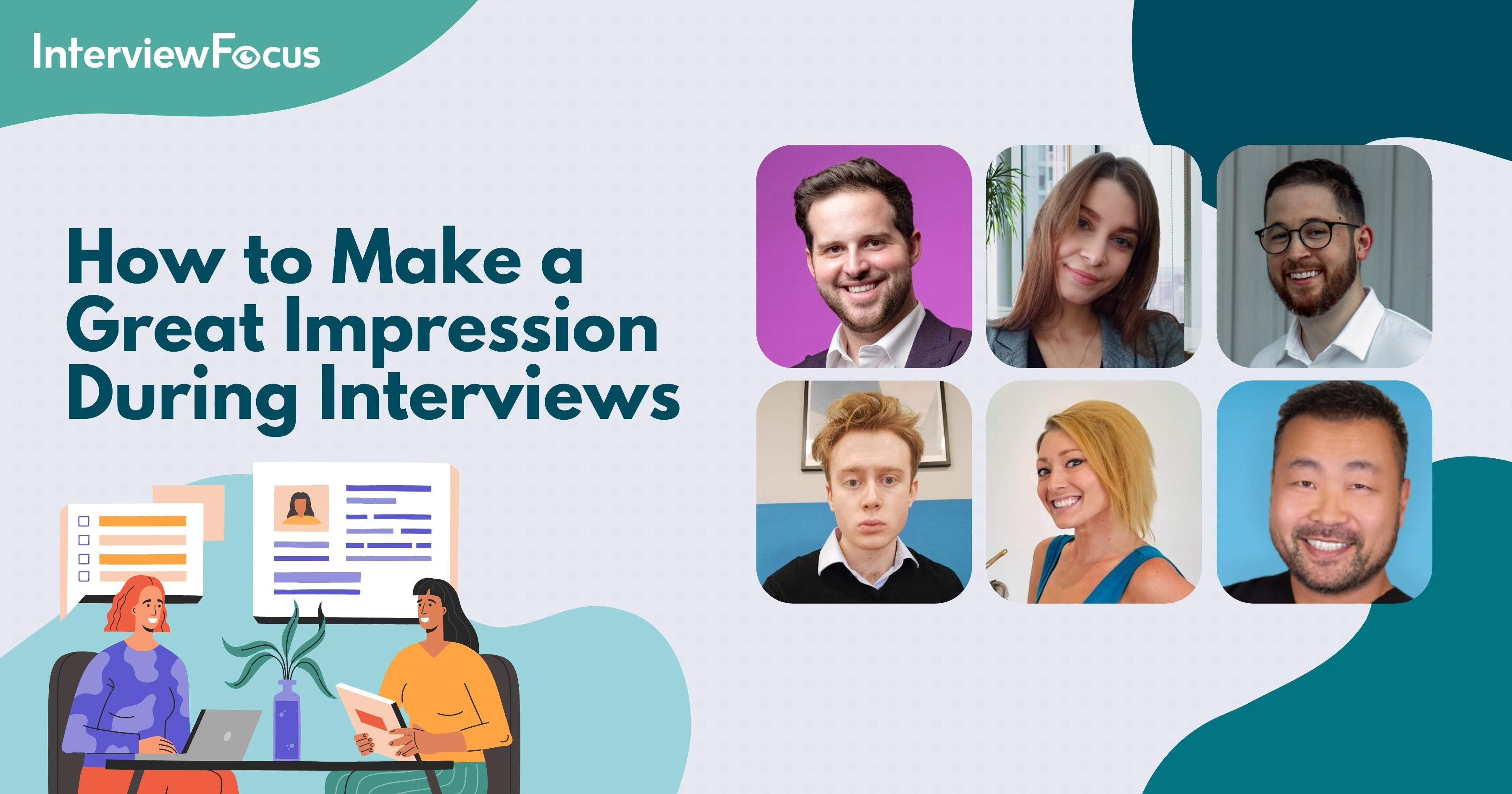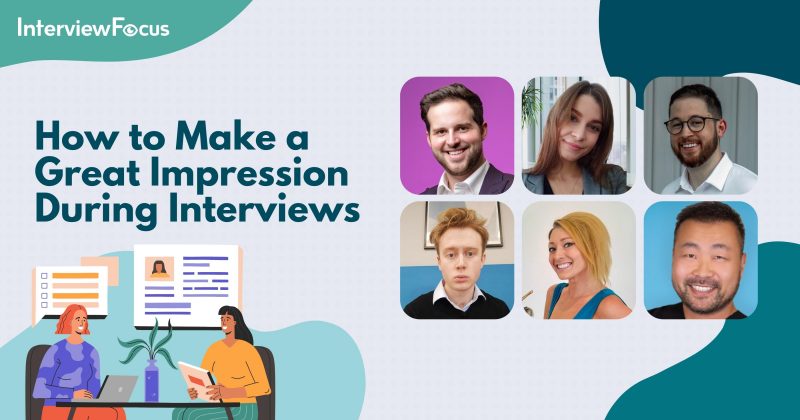How can a candidate make a great impression during an interview?
The hunt for a new job can be a daunting grind. After you’ve perfected your resume’s formatting and language, written the most personable cover letter you could, you’ve bagged it: the coveted interview. But one wrong move can undermine all of your hard work and send you right back into the slog.
So how can you make sure the impression you leave is the best one possible? We’ve asked 11 recruiters and HR professionals for their takes on how to make a great impression during your interview.
- Maintain Eye Contact and Smile
- Provide Positive Feedback
- Strive for Collaboration
- Practice Active Listening
- Be Yourself
- Convey Confidence by the Way You Speak
- Integrate Your Personal Values With Your Career
- Exude Passion and Genuine Excitement
- Ask Thoughtful Questions
- Develop a Wealth of Industry Knowledge
- Ease into a Personal Connection
Maintain Eye Contact and Smile
Whether you’re in an interview or a business meeting, make it a point to maintain eye contact and smile throughout the interview. We all know that when a person looks us in the eyes, it automatically builds a sense of trust. The ability to interact with confidence not only makes a person look professional, it impresses interviewers and can lead to some great job offers!
Jae Pak, Jae Pak MD Medical
Provide Positive Feedback
In order to illustrate how involved you already are with your future employer, give positive feedback on something they’re doing well or have communicated to you. This can be an award they’ve recently won, the way their website is designed, how their newest product launch is going, or even how you were greeted in reception. For a final kicker, based on your field of expertise, give some advice on how they can even make whatever it is bigger and better.
Bjorn Verbrugghe, Unigift
Strive for Collaboration
Show your passion to collaborate. It immediately shows that you are a team player and want to work with other people on projects in a productive way that benefits the team. Make it clear you are eager to do your best work and welcome creative input from others in order to create something truly special. It’s best to strive to join a supportive team.
Stephen Skeel, 7 Wonders
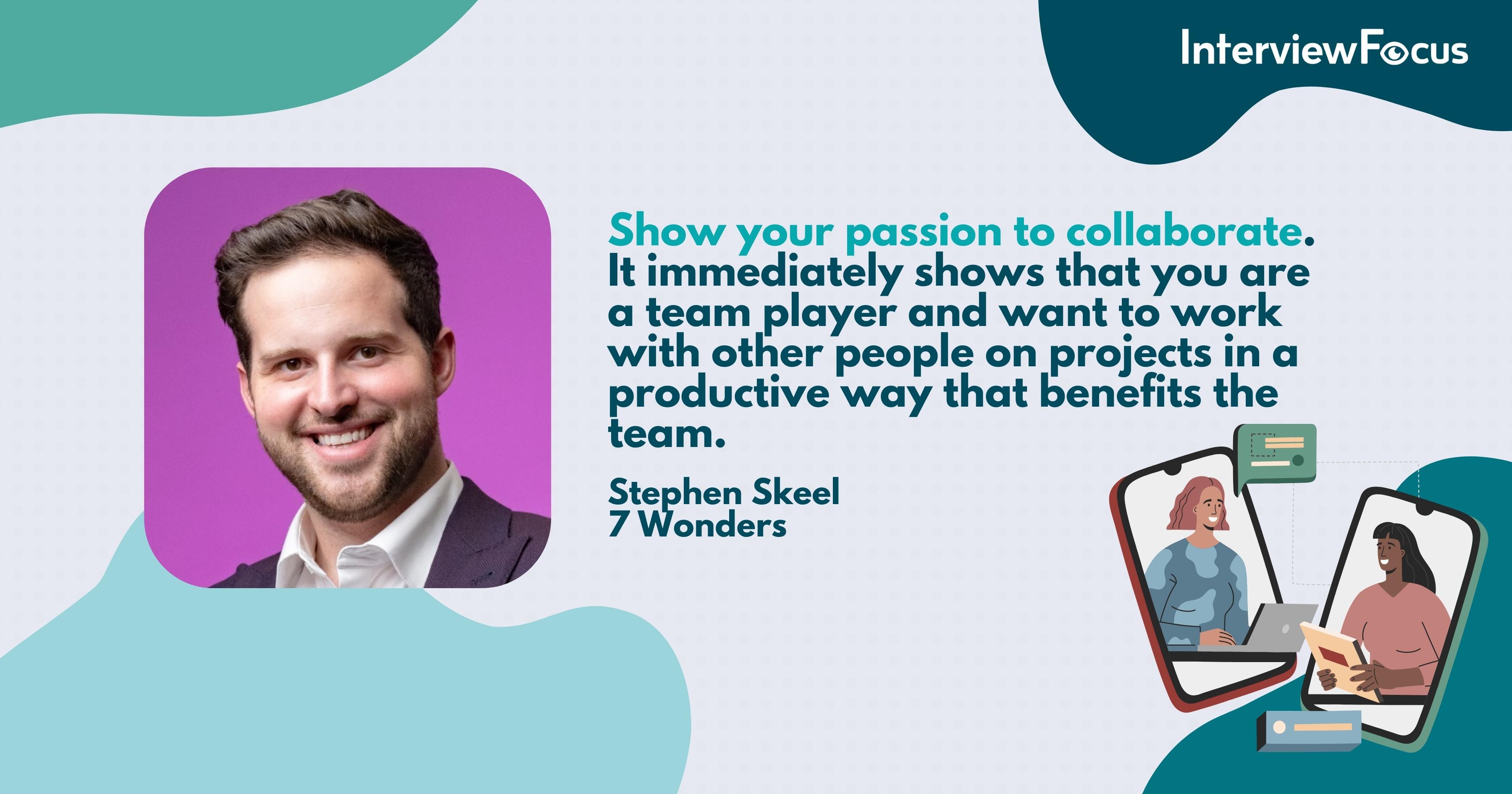
Practice Active Listening
Interviews are one of the times in life when people are most focused on leaving a good impression. We think about what we want to say, how we’d like to present ourselves, what outfit we want to wear. Sometimes, we can be so preoccupied with how we’re being perceived, that we forget to actually pay attention to the interviewer and what they’re saying.
This common mistake should be avoided, as the interview is the perfect opportunity to showcase your communication skills. Therefore, it’s best to stay attuned to the interviewer, while also actively showing that you are, in fact, listening. This can be done by body language cues such as maintaining eye contact and nodding your head, but also by referring to the presented information and asking relevant questions.
Maja Kowalska, Zety
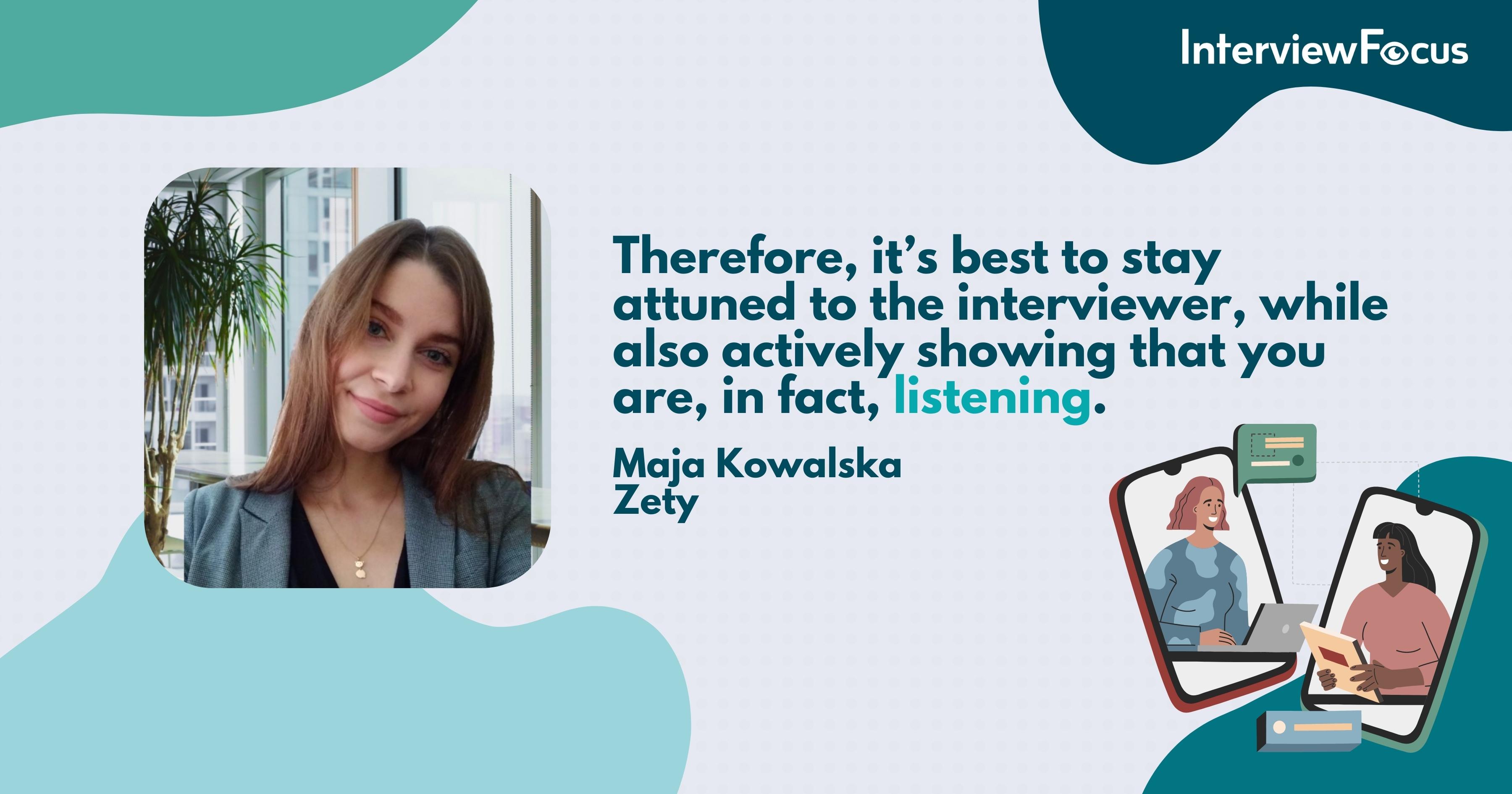
Be Yourself
Be yourself. Show your personality and be sure to smile. No hiring manager wants to interview a candidate who is stiff and putting on an act to impress them. Try to be personable and build a friendly but professional relationship in the interview. They’ll pay attention to your attitude and if you’re a good cultural fit. After all, you should want to be hired for the person you are and what you bring to the table.
Natália Sadowski, Nourishing Biologicals
Convey Confidence by the Way You Speak
The first thing people will judge you by is how you talk. This is true even for the most bias-conscious interviewer. I strongly recommend practicing your communication skills so you can confidently walk into any interview. A strong communicator is, first and foremost, a good listener. So, demonstrate to the interviewer that you’re listening keenly to understand them.
When it is time for you to speak, talk slowly but deliberately, sticking to the topic at hand. Be intentional with your words and ensure that the interviewer hears you. Remember to keep eye contact and avoid excessive hand gestures and too many filler words—these can unintentionally convey that you’re unsure about what you’re saying, so why should the interviewer believe you? In the same vein, try not to over-communicate. Take frequent, quick pauses to regroup your thoughts and give the interviewer time to process your words. This excellent tactic builds rapport and keeps the hiring manager engaged throughout the interview.
Paul French, Intrinsic Executive Search
Integrate Your Personal Values With Your Career
Somewhere along the way, our core values may take a back seat in our careers. While this is natural and to be expected, it’s also a sign of resilience when someone is on the path they desire most and are working towards building a career where all parts of them feel supported. As one builds more confidence and self-efficacy in their professional life, one of the most important career goals becomes an alignment with their values and a strong integration of them into their career.
Marc Roca, 4WD Life
Exude Passion and Genuine Excitement
Exuding passion and genuine excitement for the role has not only secured me some of my favorite positions in the past, but also serves as the core quality I seek out in candidates for my own business. Passion and a keen willingness to develop will not only convince a prospective employer you’ll gel well with their team, but it also makes up for any gaps in your skillset. Employers are more than willing to teach you a skill once they’re convinced you’ll give 110% to their business and make a positive impact on the team as a whole.
George Shuter, Indie Panda
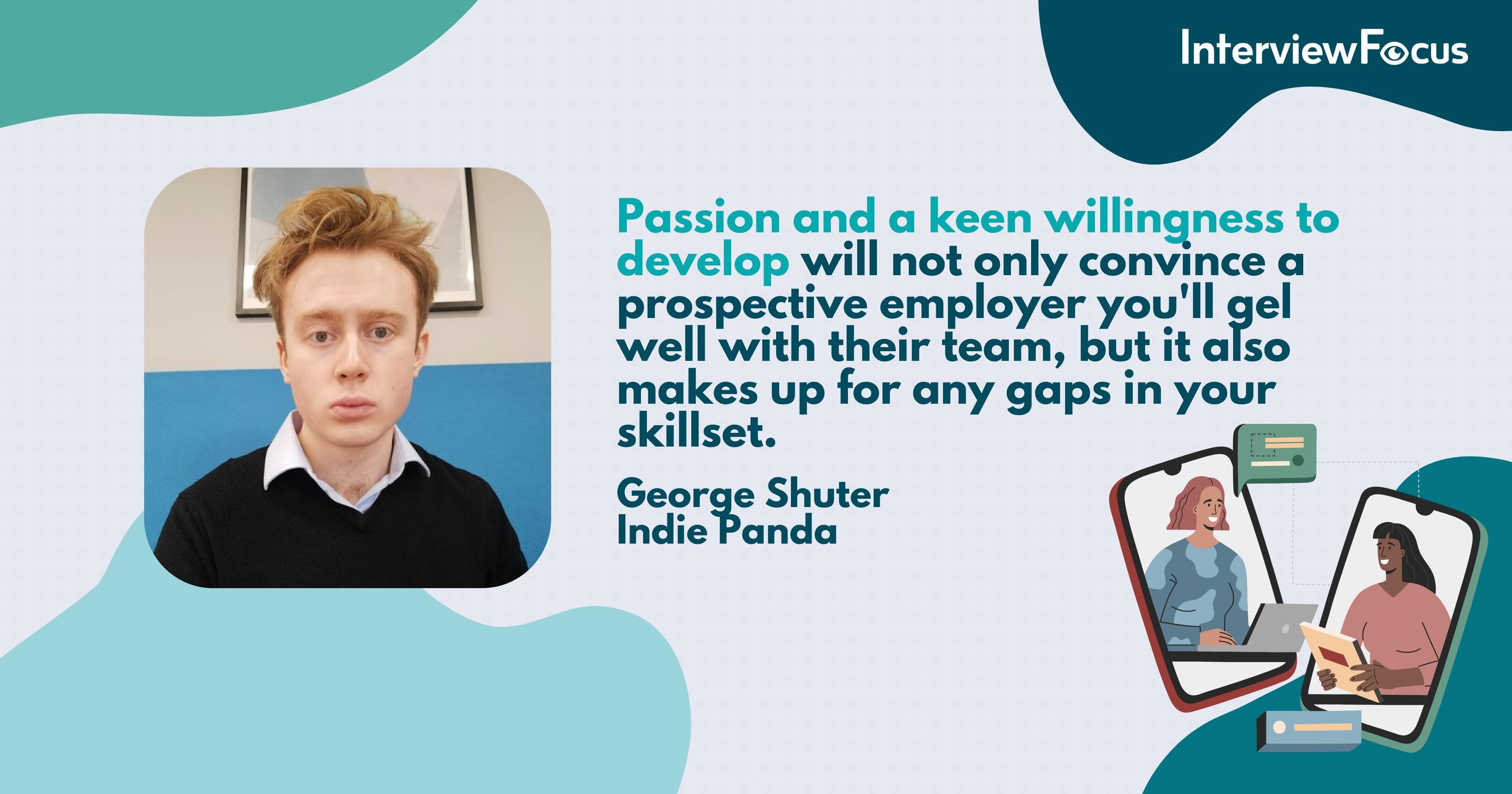
Ask Thoughtful Questions
One of the best ways to make a great impression during an interview is to come ready with thoughtful questions for the interviewer. Good general options include “what do you most love about working for the company?” and “what is the most important skill to master in the first months of the job?” However, you can also show off your research by asking organization-specific questions.
Interviews are a two-way street, and you should evaluate the company’s fit as much as the other way around. Asking questions signals your interest and engagement, and it shows the interviewer that you’re serious about your opportunity with the company vs. merely trying to gain employment anywhere that will have you.
Kate Duske, Escape Room Data
Develop a Wealth of Industry Knowledge
Every industry is different and while some hiring teams can choose to be content with a candidate who is well-versed with their specific job profile, others may require the candidate to have knowledge that goes beyond the normal expectations. This is especially true in industries that have a direct impact on the lives of people.
Either way, knowledge that goes beyond one’s profile or expertise is knowledge that can provide insight into other industry trends and be shared amongst the team. This reflects a mindset that you’re willing to learn and offer more than expertise and skills associated with just one position, a trait that’s valued by every interviewer.
David Northup, InShapeMD
Ease into a Personal Connection
As said, the first impression is the best impression. Your initial introduction should be clean and provide just enough information to get to know you without being too long or too short. After the initial introduction solidifies your stellar first impression, make a personal connection to the interviewer. This doesn’t have to be big or obvious for what you’re doing; a simple conversation might provide exactly what you need to make a solid, great connection.
From the interviewer’s provided details, dig a bit into small talk and make it deeper by saying something like, “You went to this university? I did too.” It doesn’t have to be a major connection, but easing into a conversation will set a relaxed tempo for both you and the interviewer. However, this is just to make an impression. While this technique might not get you the job, it will bring you closer to the selection and highlight your social skills.
Scott Krager, WODReview


